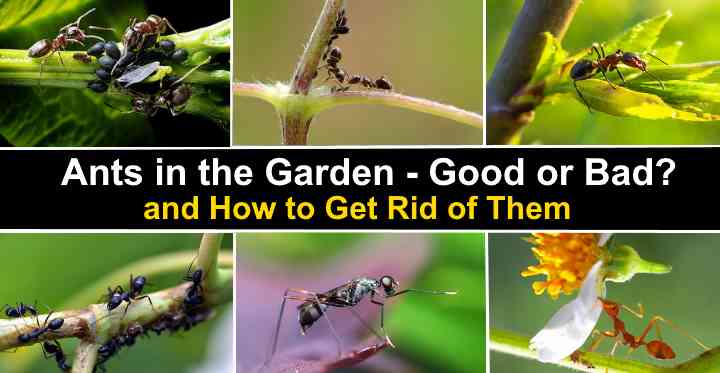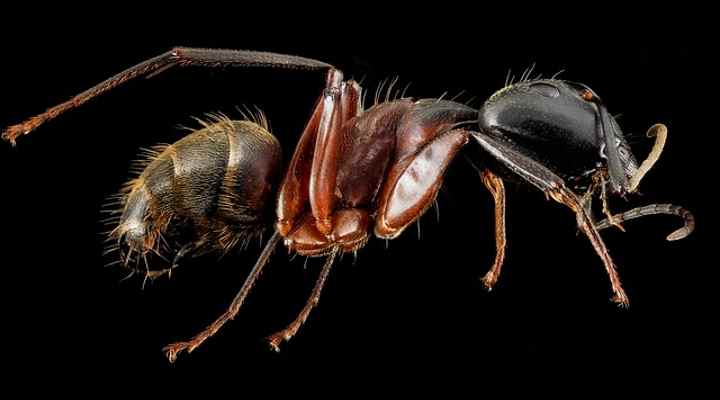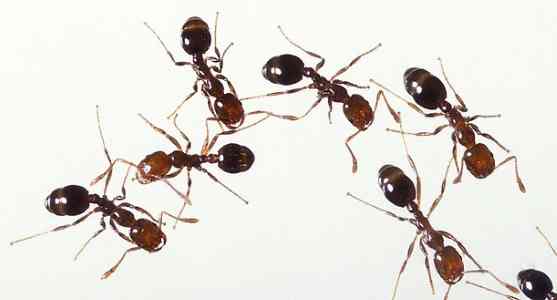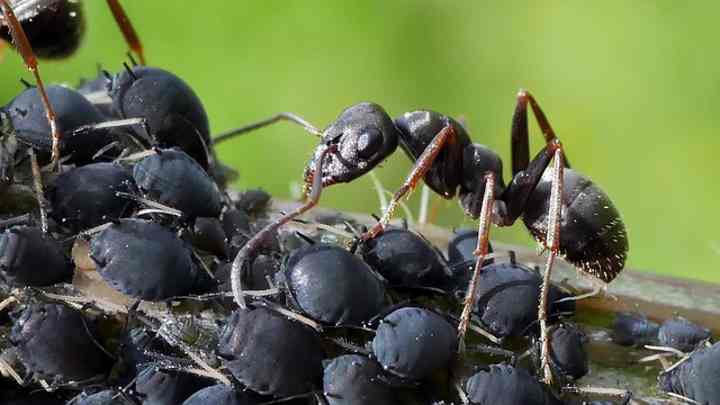Ants in the Garden – Good or Bad? (and How to Get Rid of Ants)

Ants play a beneficial role in a healthy garden’s ecosystem and can be good for gardens – ants tunnel in the ground, helping to aerate the soil and that allows moisture and oxygen to get to plant roots. The small six-legged insects also speed up the decomposition of decaying plant matter, helping to fertilize plants.
Despite their usefulness in the garden, ants have gotten a bad rap. Some gardeners view all ants as unwanted garden visitors, especially the aggressive biting fire ant.
Ants can be bad for the garden because they protect some plant pests, such as aphids, as they feed on the honeydew they produce. So, the presence of ants could be a sign of a plant-destroying aphid population. Also, an ant hill can spoil the appearance of a lush, green lawn.
So, are ants in the garden a good or a bad thing? The answer depends. In general, ants are good for soil and plant health. But there are times when it makes sense to get rid of certain ant species.
This article examines the role that ants have in maintaining a healthy garden. You’ll also find out how to get rid of ants from your garden using natural, non-toxic methods.
How Ants Benefit the Garden
Ants are not necessarily bad for the garden because they improve soil structure, helping plants grow better. Garden ants also help keep down populations of many garden pests that can damage crops. Additionally, ant behavior helps decompose organic material, which then acts as fertilizer for plants.
Here are a few reasons why it’s good to have ants in your garden.
Ants help control garden pests
Most ant species are beneficial insects that control populations of common pests. Ants feed on the larvae of bugs that can destroy plants and vegetables. Killing off caterpillar, moth, and bug eggs minimizes crop destruction if the pests were allowed to live.
A 2016 study on the effect of using ants for pest biocontrol found them to be effective predators. Scientists observed that where ants could flourish, populations of common pests decreased. Common species of ants feed on moth eggs and larvae. Gardeners who promote biodiversity and introduce beneficial insects can reduce the number of garden pests naturally.
Ants are vital for a balanced ecosystem
Common garden ants benefit garden soil and help make it more fertile. Ants are industrious, social creatures that tunnel through the ground in search of food. In doing so, ants break up soil and allow oxygen, nutrients, and moisture to get to plant and vegetable roots.
Researchers from Harvard Forest found that ants have an essential role in the environment. For example, ants take organic matter down tunnels, which decomposes and acts as plant fertilizer. Additionally, ants also help disperse seeds.
Another study found that black garden ants (Lasius niger) and common red ants (Myrmica rubra) play a crucial role in garden ecosystems. The scientists called ants “ecosystem engineers and predators.” Also, ants act as a food source for larger animals, thus increasing biodiversity even more.
Ants aerate garden soil
Ants have a positive impact on soil health by helping to aerate it. Healthy soil needs oxygen, nutrients, and moisture so that plants and vegetables grow. Ants are one of the beneficial insects that boost soil health.
There is also scientific research showing why ants are beneficial for soil health. When ants burrow through the soil, they allow more air to circulate. Ant behavior in the ground increases nutrient content, causes faster decomposition of organic matter, and improves pH levels.
Are Ants in the Vegetable Garden a Bad Thing?
Ants in the garden have many benefits and provide a useful service. The only time when ants may become a nuisance is when their numbers grow too large. An ant infestation can start to affect crops. And the bad news is that they could signify a problem with aphids—something you want to avoid.
But generally, ants get rid of many unwanted pests, benefit soil structure, and increase biodiversity. Contrary to what some people say, ants don’t strip leaves from vegetation or feed on plant roots. So, if you see ants scurrying around your vegetable garden, you can safely let them be.
Types of Ants that Can Cause Damage in The Garden
Some species of ants can do damage to your garden. The types of ants that are not good for gardens are carpenter ants and fire ants. Let’s look more closely at the kind of damage these ant species can do.
Carpenter ants

A close up picture of carpenter ant
Carpenter ants (Camponotus) are large black ants growing up to 1” (2.5 cm) long. They can do damage in gardens because they build nests in wooden structures.
Fire ants

A close up image of fire ants
Fire ants (Solenopsis) are stinging ants that can inflict a nasty “bite” on humans. Fire ants also feed on seeds and young plants, so an infestation of fire ants could impact your vegetable garden.
Why Ants Can Cause Damage in The Garden
Ants can cause damage in the garden because they can increase the population of aphids, and may cause property damage. Some ant species can damage the vegetable garden because they feed on seedlings and young plants
Here is more information on how ants can cause damage in the garden.
Ants can increase the population of some garden pests

Carpenter ant feeding on the honeydew produced by aphids
All species of ants feed on sugary substances. While this may not in itself harm your garden, aphids can attract a large number of ants. For example, ants protect aphids from other predatory insects meaning that they are harder to control. Also, carpenter ants farm aphids to feed on the honeydew they produce.
This mutualistic symbiosis process can result in an increased number of garden pests that can destroy plants and crops.
Some ant species cause property damage
Carpenter ants can damage trellises, wooden borders, sheds, and even your house’s structure. So, an infestation of carpenter ants may not only destroy your plants; they could weaken your home. It’s vital to get rid of carpenter ants if you see them in your garden or home.
Fire ants cause nasty bites
Fire ants inflict painful stings if you provoke them. These stinging insects get their name from the burning sensation their bites leave behind. After the pain from the sting goes away, painful red bumps appear on the skin. In some cases, fire ant bites result in allergic reactions that require emergency treatment.
Some ant species feed on vegetation
Fire ants are pests in vegetable gardens because they feed on seedlings and young plants. According to researchers from Clemson University, fire ants can damage some vegetable crops. They can also forage for food in lawns if you fail to control their population.
How to Get Rid of Ants in the Garden
Although it can be challenging to completely rid your garden of ants, some natural methods can help control their populations.
Here are six ways that you can get rid of ants in your garden:
Get rid of garden ants using borax and sugar
A mixture of borax and sugar is an effective way to control ants in the garden. Mix half a cup of sugar and one and a half tablespoons of borax with one and a half cups of warm water. Soak cotton balls in the sugary ant bait and put them where ants are in your garden.
Borax and sugar bait is an effective way to kill the entire ant colony. The advantage of using borax is that it’s lethal to ants, however it doesn’t kill them immediately. Workers ants will consume the borax bait and carry it to their colony for other ants to eat. This helps to kill ants under the soil in their colony.
An alternative to the borax and sugar bait for ants would be to combine borax, sugar, and some warm water in a plastic bottle. Poke holes in the bottle and lay the borax traps in your garden near ant hills or other places you notice them at work. Very soon, the bottle should be filling up with dead ants.
In some cases, you may find the borax and sugar doesn’t work. An alternative could be to replace the sugar with peanut butter to eradicate garden ants.
There is some scientific evidence that using a sugary boric acid bait kills ants. Researchers found that by strategically placing borax baits, they significantly reduced ant populations in a hospital. In some cases, sugary borax baits were 100 percent effective at eliminating ant infestations.
Kill ants in the garden using cornmeal
You could try using cornmeal to bait and kill ants in your garden. For cornmeal to be an effective ant bait, you should mix it with borax. Mix nine parts boric acid and one part of cornmeal. Add some vegetable oil to make a smooth paste. Put in a plastic bottle, punch some holes, and place it where you see ant activity.
It’s a myth that cornmeal alone kills off garden ants. Cornmeal will attract ants as they search for food, and the boric acid will kill them off. The advantage of cornmeal and borax is that it’s slow-working, and ants take the “food” back to their nest.
Eradicate ants outside by using homemade vinegar and water solution
Vinegar is another way to eliminate ant infestations from your garden. Combine equal parts of white vinegar and water and fill a spray bottle. You can spray the vinegar solution directly on ants to kill them on contact.
Unfortunately, trying to rid your garden of ants by spraying them can be very time-consuming and, ultimately, ineffective.
Control ants using diatomaceous earth
Diatomaceous earth (DE) is a natural, non-toxic substance that kills ants. Spread a layer of diatomaceous earth on dry soil wherever you notice ant activity or near their nest. Diatomaceous earth kills ants by destroying the ants’ outer layer and causing the insects to die from dehydration.
It’s vital to remember that, for diatomaceous earth to kill ant populations effectively, the ground must be dry. So, you’ll need to reapply the fine white powder after rainfall and when the soil has dried out.
You should also note that DE may not work on all species of ants. Some people report that it’s best for common black ants. However, because diatomaceous earth is relatively cheap and easy to apply, it’s worth trying in our garden.
It’s important to note that if you have animals outside you should use food grade DE. Being a fine powder, also wear protective eye covering and breathing mask when applying DE.
Control ants by eradicating aphids
Very often, aphids attract ants, and ants then protect aphids from their enemies. Aphids quickly destroy plants and can cause significant problems in vegetable gardens. However, ants may alert you of an aphid infestation. Noticing many ants around one particular plant or several plants could be a sign of aphids.
The problem of the aphid-ant relationship is that ants won’t allow beneficial insects to eat aphids. So, to get a large ant population, you will have to get rid of aphids.
To rid your garden plants of aphids, mix one tablespoon of liquid dish soap with a gallon (4 l) of water. Mix well in a sprayer and liberally spray foliage on both sides to get rid of aphids and other garden bugs. Reapply the aphid bug spray frequently to eradicate aphids.
Destroy ant nests and ant hills with boiling water
Pouring boiling water directly on ant nests will kill most of the ants in the colony. If you notice an ant hill, you should rake the soil away. Then pour plenty of boiling water into the nest. Hopefully, you can kill most of the ants, including the queen. Of course, you should be careful handling boiling water.
There are a few things to keep in mind when using boiling water to kill ants:
- Don’t use boiling water to get rid of ants in lawns as you will scorch the grass. You can try using copious amounts of cold water to disrupt the ants’ habitat.
- Boiling water may not effectively eradicate ants from yards if the nest is under a paving slab.
How to Keep Ants Out of The Garden
To prevent a large population of ants in your garden it’s important to get rid of aphid infestations on plants. Aphids look like tiny pear-shaped insects crawling on plant stems and leaves. Depending on the species and what they feed on, these tiny bugs can be green, black, brown, white, pink, yellow or gray.
The damage aphids cause to plants includes stunted growth, wilted or crinkled foliage, and leaf drop. Aphids also secrete a sticky liquid called honeydew that feeds the ants and causes black sooty mold to grow on the plant. In the article about aphids on plants, you can find effective ways to kill aphids.
Another way to control ant population in your garden is to scatter a few ant traps around the garden, such as boric acid and sugar traps, to prevent ant numbers from becoming too large.
Getting Rid of Ants in the Lawn
Ants can sometimes create ant hills and ruin the appearance of your lawn. Raking the ant hills, using a natural ant-repelling solution, or spreading diatomaceous earth may help. But getting rid of ants from lawns can be tricky as you don’t want to destroy your grass at the same time.
Unless you have a sizeable ant infestation or you’ve got carpenter and or fire ants, it’s best to learn to live with the beneficial insects. It’s good to remember that ants feed on eggs and larvae of lawn pests.
But what if ants are causing too many problems for your lawn?
Here are a few handy tips to try and rid your lawn of ants:
- Rake ant hills. Rake all the soil from an anthill as soon as it appears. Disturbing the ants may cause them to move to other areas of your garden.
- Spray soap and water solution to get rid of the ants. Mix 1-2 teaspoons of liquid dish soap with 1 quart (1 l) warm, not boiling water. Spray or pour the solution into the ant mound to disturb the ants’ habitat.
- Use diatomaceous earth to get rid of the ants. Liberally sprinkle DE wherever there’s ant activity on your lawn. Reapply as often as necessary until the ants are gone for good.
How to Kill Ants in the Yard
Killing an ant colony in your yard can be challenging, and it’s rarely possible to get rid of ants outside permanently. If an ant population is getting out of control, you could lay boric acid and sugar traps in your yard. The traps will eventually help you get rid of ants outside and control their population.
Learn how to identify many types of ants (with pictures).
Related articles:
- Effective Ways to Kill Aphids on Indoor and Outdoor Plants
- Types of Insects with Pictures and Names
- 13 Types of Ladybugs With Pictures
